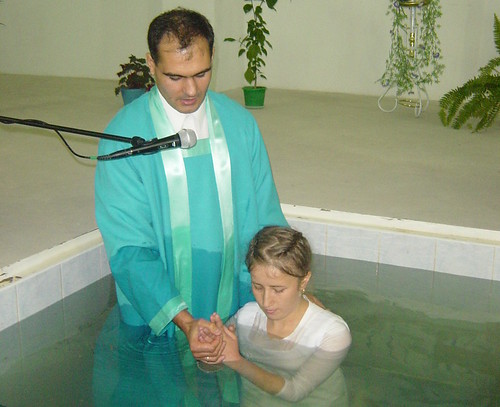I have received a question from a reader of the portal:
I can not understand what the passage from 1 Corinthians 15:29 means. Mormons say that you have to be baptized for the dead. I want to find more about the differences between us, Christians and Mormons. (Mishu)
To understand better what is meant here, let us firstly read the passage mentioned by the Apostle Paul, where it is written:
Otherwise, what will those do who are baptized for the dead? If the dead are not raised at all, why then are they baptized for them? (1 Corinthians 15:29)(NASB)
Only once mentioned in the Bible
It is only this passage in the Bible that mentions about baptism for the dead. God doesn’t teach anywhere in the Bible about this practice and there is no single command that asks this. Inversely, the Bible says that the most important condition for a person to be baptized is his personal faith and that the decision to be baptized is a personal one, that no one can make for you. The Book of Acts from the Bible relates us how evangelist Philip told the good news about the Lord Jesus to an Ethiopian eunuch:
As they went along the road they came to some water; and the eunuch said, “Look! Water! What prevents me from being baptized?” And Philip said, “If you believe with all your heart, you may.” And he answered and said, “I believe that Jesus Christ is the Son of God.” And he ordered the chariot to stop; and they both went down into the water, Philip as well as the eunuch, and he baptized him. (Acts 8:36–38)(NASB)

There is nowhere in the Bible a certain case to describe that one has been baptized for the dead.
Why does Apostle Paul mention about those who are baptized for the dead?
The problem of receivers of the first Epistle to Corinthians came to a point that they didn’t believe in the resurrection of the dead. The Apostle brings them many arguments and then he shows that if you don’t believe in the resurrection of the dead, then Christian faith is in vain. It seems that Apostle Paul makes reference to some people who knew very little about the holy things, or maybe others practiced another religion, but, according to their religion, and having the desire to save those whom they loved but passed away, they chose to be baptized for them, hoping that in that way they would be set free by the suffering from the hell. When he refers to them, Paul wants to show the Corinthians that those people, no matter how ignorant they were and how little knowledge about the holy things they had, nevertheless, they believed in the resurrection of the dead, while Corinthians, after they had been taught so much from the Scriptures, they were looking more unfaithful than those who are baptized for the dead, because they didn’t believe in the resurrection of the dead anymore.
When Apostle Paul wrote the first Epistle to Corinthians, no Mormons existed at that time
Mormons, or as they call themselves “The Church of Jesus Christ of Latter-day Saints” is a heresy founded by Joseph Smith in 1830. Here is what WikiPedia writes about the efforts made by these people to save the dead:
The Church of Jesus Christ of Latter-day Saints (commonly called Mormons) teaches that upon death, righteous souls go to Paradise, while the souls of the unrepentant go to a spirit prison, where the former are sent from Paradise to preach the Gospel to the latter, and the living perform work in LDS Temples providing ordinances that can only be received in the flesh, which the repentant imprisoned ones can accept. The Book of Mormon describes both of these as temporary states, preceding resurrection and final judgement.[5] When the time of the literal resurrection arrives, the spirits of everyone who has ever lived are reunited with their physical bodies. The degree of righteousness or unrighteousness in which a person had lived his or her life determines what level of glory they will attain after the final judgement.[6]
A proverb used by those who study the Scripture says: “Every text out of the context is a pretext” and the basic rules to interpret the Scriptures don’t allow us to build a doctrine based on a single text. So, we can not accept a teaching that says that the baptism for the dead should be practiced. If we love those who are close to us, we have to share with them the Gospel now, and to urge them to believe in the salvation sacrifice of the Lord Jesus Christ and to repent. There is no repentance after death.
Concerning the second part of the question, about the differences between Christian faith and the Mormons teaching, this is a larger subject, and I will write another article soon.
Translated by Felicia Djugostran

